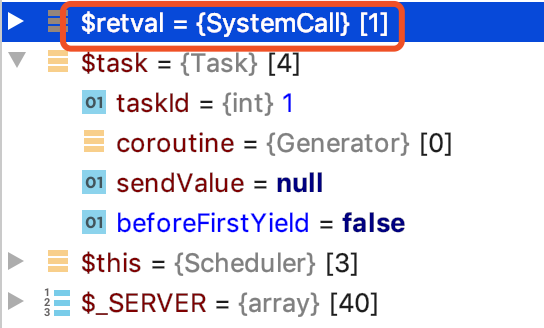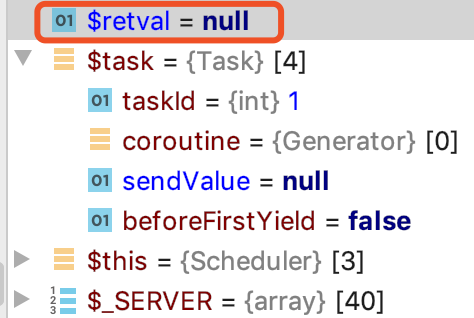php协程笔记
前言
在实习的过程中使用到了腾讯微服务平台(Tencent Service Framework,TSF)框架,tsf中经常看到
$ret = (yield func(a,b));
这样的用法。 yield 外面包括号的用法并不常见,实际上这是yield的一种特殊的用法——协程。 这里我准备通读一下这一领域的经典教程,好好理解yield 和 协程 是如何在PHP 项目开发中起到作用的。
作者背景:风雪之隅,PHP开发组核心成员,鸟叔,PHP7的主要开发者。本篇文章其实他对一篇英文教程的翻译之作。
之所以标题起笔记,原因是原文理解起来稍有难度,所以我这里加上自己的理解。本篇可以在大家读原文的过程中做一个参考。
进程、线程、协程的区别
进程
-
进程是程序执行的一个实例
-
进程是资源分配的最小单位,资源包括:CPU,内存,I/O等
-
进程间的通讯方式(IPC) <---- 抄,参考https://blog.csdn.net/daaikuaichuan/article/details/82951084
- 管道 Pipe
- 命名管道 FIFO
- * 消息队列(Message Queue)
- 腾讯的hippo
- Kafka
- 信号量(Semaphore)
- 共享内存(Shared Memory)
- * 套接字(Socket)
线程
- 轻量级进程(Lightweight Process,LWP)
- CPU调度的最小单位
- 进程由于是拥有系统资源,所以切换时需要保存上下文环境,开销大。线程开销小
协程
- 协程是一种比线程更加轻量级的存在
- 与进程线程不同�的是,协程是完全由程序控制在(用户态执行)
- 举例: 当我们读文件的时候,我们可以主动让出控制权,而不是等待I/O操作完成。
- 特点
- 极高的执行效率,没有线程那么大的切换开销。 我们知道涉及到内核参与管理的程序,需要从用户态通过中断的方式切换到内核态。这样的开销是极大的。
- 不需要多线程的锁机制,在协程中控制共享资源不加锁
- 对用户可见
- 协同,因为是由程序员自己写的调度策略,其通过协作而不是抢占来进行切换
- 协程的思想本质上就是控制流的主动让出(yield)和恢复(resume)机制(来源:PHP7下的协程实现)
迭代生成器
迭代生成器是我们对于 yield 最常用的一个功能。 用 yield 替代 return 作为函数的返回最大的作用是,它返回的不仅是一个值,而是一个迭代器。这一优点在面对无法载入到内存的大型数据集有很大的作用。
如以下代码
function xrange($start,$end,$step = 1){
for ($i = $start ; $i <= $end ; $i += $step){
yield $i;
}
}
foreach (xrange(1,10000000000) as $num) {
echo $num ."<br>";
}
很明显,这里使用return的话,返回的是一个非常大的数组,当你数据量特别大的时候会造成数据溢出的问题。 yield 的神奇之处在于,它会保持生成器的状态。函数会一直运行,直到下一个yield。程序执行的控制流可以在主代码和生成器函数之间切换,也不用用户担心上下文环境的问题。 优点
- 运行大型数据集
- 不用编写就能生成复杂的生成器
写一个生成器的流程,需要
- 被迭代的类实现 IteratorAggregate 接口
- 定义一个返�回迭代类的方法,这个类必须实现Iterator 接口
- 提供一系列必须实现的方法
- rewind : 函数内部指针设置回到数据开始处
- valid : 判读是否还有数据
- key : 返回数据指针值
- current : 返回当前指针指向的值
- next : 移动到下一位 yield 关键字简化了实现迭代器的过程。
- TODO 实现一个PHP Iterator 对象
协程
yield 的一个特性是函数每次执行到yield 的时候,就会主动让出控制权。这一点可以很好的帮助我们控制程序的执行顺序。
send 函数
public Generator::send ( mixed $value ) : mixed
向生成器中传入一个值,并且当做 yield 表达式的结果。
然后继续执行生成器。
如果当这个方法被调用时,生成器不在 yield 表达式,那么在传入值之前,它会先运行到第一个 yield 表达式。传入生成器的值。这个值将会被作为生成器当前所在的 yield 的返回值。
利用send 函数,我们可以很方便的与协程进行交互,具体如下。
yield 作为参数接受者
<?php
function logger($fileName) {
echo "这个语句只会执行一次","\n";
while (true) {
echo yield . "\n";
//函数每次都会执行要yield 暂停,然后让出控制权。
}
}
$logger = logger(__DIR__ . '/log');
$logger->send('Foo'); // 输出 "这个语句只会执行一次", 输出 Foo \n;
$logger->send('Bar'); // 输出 Bar \n;
?>
yield 作用:
-
- 类似于debug 时候的断点,每一次都是运行到 yield 停止
-
- 可以利用send方法给 yield 传递数据
那自然会有一个疑问,此处的 yield 有没有接受数据回来? 经过试验,发现此处的yield 是没有返回数据的。
这个例子可以看到yield 并没有返回数据,是NULL
<?php
function logger($fileName) {
echo "这个语句只会执行一次","\n";
while (true) {
echo yield . "\n";
//函数每次都会执行要yield 暂停,然后让出控制权。
}
}
$logger = logger(__DIR__ . '/log');
$a = $logger->send('Foo'); // 输出 "这个语句只会执行一次", 输出 Foo;
var_dump($a); // 返回 NULL , 这里的yield 并没有返回任何值
?>
yield 同时接受和发送数据
<?php
function gen() {
$ret = (yield 'yield1');
var_dump($ret);
$ret = (yield 'yield2');
var_dump($ret);
}
$gen = gen();
var_dump($gen->current()); // string(6) "yield1"
var_dump($gen->send('ret1')); // string(4) "ret1" (the first var_dump in gen)
// string(6) "yield2" (the var_dump of the ->send() return value)
var_dump($gen->send('ret2')); // string(4) "ret2" (again from within gen)
// NULL (the return value of ->send())
?>
逐句分析
$ gen = gen() 指针指向这个迭代器
$ gen-> current() 运行到第一个yield ,返回 yield 语句的值 yield,并 输出 类型和值
$ gen ->send("ret1") 当前生成器在 yield 语句,于是把 "ret1" 当做 (yield "yield1")的结果,并赋值给 $ret1。而且还会执行一个 gen->next() 移到下一个yield 处,返回第二个yield 语句的返回值
$ gen ->send("ret2") 当前生成器在第二个yield 语句,把"ret2" 当做 (yield "yield2") 的结果,并赋值给 $ret2 。继续向下执行,此时指针会移至迭代器末尾,此时已经没有yield ,所以返回NULL
多任务合作
为了帮助理解 协程和任务调度的关机,yield 在 任务运行的过程中可以主动中断自身,并把控制权交还给调度器。
这里我们先需要实现: 任务、调度器
任务
<?php
class Task { //实现一个任务
protected $taskId; //任务ID
protected $coroutine;//协程
protected $sendValue = null;//send 传送的value
protected $beforeFirstYield = true;//是不是第一次传送
// 因为每次send 返回的值,都是当前yield 的下一个yield 的返回值,这导致��了第一个yield 的返回值被丢弃了。对于第一个 yield,我们需要用current()获取返回值,从第二个往后用send()获取返回值。
public function __construct($taskId, Generator $coroutine) {//协程类型是 迭代器
$this->taskId = $taskId;
$this->coroutine = $coroutine;
}
public function getTaskId() {
return $this->taskId;
}
public function setSendValue($sendValue) {
$this->sendValue = $sendValue;
}
public function run() {
if ($this->beforeFirstYield) {// 如果是第一次yield,那么就用current()返回
$this->beforeFirstYield = false;
return $this->coroutine->current();
} else {//如果不是第一个yield,就用send设置一个value,并返回下一个yield的值
$retval = $this->coroutine->send($this->sendValue);
$this->sendValue = null;//设置完毕清空value
return $retval;
}
}
public function isFinished() {
return !$this->coroutine->valid();// 判断迭代器是否迭代完毕
}
}
迭代器
<?php
class Scheduler {//实现一个调度器
protected $maxTaskId = 0; // 最大任务
protected $taskMap = []; // taskId => task
protected $taskQueue;// 任务队列
public function __construct() {
$this->taskQueue = new SplQueue(); // 实例化一个队列
}
public function newTask(Generator $coroutine) {
$tid = ++$this->maxTaskId;// 生成任务id
$task = new Task($tid, $coroutine); // 创建任务
$this->taskMap[$tid] = $task;// 标识 taskId => task
$this->schedule($task);
return $tid;
}
//任务入队
public function schedule(Task $task) {
$this->taskQueue->enqueue($task);
}
//任务运行
public function run() {
while (!$this->taskQueue->isEmpty()) {
$task = $this->taskQueue->dequeue();// 出队
$task->run(); //任务运行
if ($task->isFinished()) { //当前任务结束,删除
unset($this->taskMap[$task->getTaskId()]);
} else {
$this->schedule($task);//未完成的话,放入队尾继续执行
}
}
}
}
?>
用一个例子看看程序是否按照我们的期望在运行
<?php
include ("Task.php"); // 载入定义好的模块
include("Scheduler.php");
function task1() {// 程序运行10次
for ($i = 1; $i <= 10; ++$i) {
echo "This is task 1 iteration $i.\n";
yield;
}
}
function task2() {// 程序运行5次
for ($i = 1; $i <= 5; ++$i) {
echo "This is task 2 iteration $i.\n";
yield;
}
}
$scheduler = new Scheduler;
$scheduler->newTask(task1());
$scheduler->newTask(task2());
$scheduler->run();
结果如下:
This is task 1 iteration 1.
This is task 2 iteration 1.
This is task 1 iteration 2.
This is task 2 iteration 2.
This is task 1 iteration 3.
This is task 2 iteration 3.
This is task 1 iteration 4.
This is task 2 iteration 4.
This is task 1 iteration 5.
This is task 2 iteration 5.
This is task 1 iteration 6.
This is task 1 iteration 7.
This is task 1 iteration 8.
This is task 1 iteration 9.
This is task 1 iteration 10.
发现程序是交替运行的,和我们的预期是相同的。因为我们使用了队列的结构,若是一个任务从队列中取出后并没有运行结束,我们会放入队尾继续运行。
与调度器之间的通信
我们再看一眼,上面例子中需要运行的程序
function task1() {// 程序运行10次
for ($i = 1; $i <= 10; ++$i) {
echo "This is task 1 iteration $i.\n"; // <-- 若是要在用调度器中的taskid 替代此句需要怎么做。
yield;
}
}
如何实现:任务与调度器�之间的通信。
我们使用的是 进程用来和操作系统会话的同样的方式来通信:系统调用。
要注意的是,不能简单的把调度器作为一个参数,传递给任务,不然很危险。这里作者通过yield表达式,配合send 来传递信息。
首先是对可调用的系统调用做一个封装
<?php
class SystemCall {
protected $callback;
// 传入的值是 一个可调用的类/函数
public function __construct(callable $callback) {
$this->callback = $callback;
}
// __invoke:当类发生调用的使用使用
// 这样,类在使用的时候看上去和一个函数一样
// 传入的参数是 任务 和 调度器
// �作用是运行 初始化的函数/类
public function __invoke(Task $task, Scheduler $scheduler) {
$callback = $this->callback;
return $callback($task, $scheduler);
}
}
?>
下面我们需要进行消息通讯
<?php
function task($max) {
// 我们需要传入 $tid 的值 从调度器中
$tid = (yield getTaskId()); // <-- here's the syscall!
for ($i = 1; $i <= $max; ++$i) {
echo "This is task $tid iteration $i.\n";
yield;
}
}
$scheduler = new Scheduler;
$scheduler->newTask(task(10));
$scheduler->newTask(task(5));
$scheduler->run();
?>
这里,我们需要对传入的getTaskId 进行修改
传入的值是来自与调度器和任务的,结合之前的封装的系统调用
<?php
function getTaskId() {
return new SystemCall(function(Task $task, Scheduler $scheduler) {
$task->setSendValue($task->getTaskId());
$scheduler->schedule($task);
// 这里返回的是一个系统调用
// 作用是给任务设置 send 的值,send值的内容是 taskid
// 把此任务加入调度器的队列中去
});
}
这里return 的不是如函数名写的 taskid,而是一个系统调用。
最后程序中的 $tid = (yield getTaskId()); 又会把这个系统调用传入调度器的队列中
进过这样的操作,我们调度器的队列中有两种类型的任务
- SystemCall类型,但是它也可以和函数一样调用
- Task 类型,也就是我们的任务类型
所以我们必须还要修改一下调度器的run方法(其实就是加入一段对SystemCall 的处理)
public function run() {
while (!$this->taskQueue->isEmpty()) {
$task = $this->taskQueue->dequeue();
$retval = $task->run();
// 这一段是新加的,如果出队的类型是系统调用,就在调度器里面调用它,传入任务 和 调度器
// 调用的结果是
// $task 会设置一个 Send 值
// $this(调度器) 会把这个 $task 加入到调度器的末尾
if ($retval instanceof SystemCall) {
$retval($task, $this);
continue;
}
//--------------------------
if ($task->isFinished()) {
unset($this->taskMap[$task->getTaskId()]);
} else {
$this->schedule($task);
}
}
}
在xdebug 的帮助下,我们可以看到第一次 $retval = $task->run() 的返回值,会走到 Task(line: 24) 的$this->coroutine->current(); 最终取得的 getTaskId() 的返回值(类型为 SystemCall)

第二次走到$retval = $task->run() 的时候,最终是返回task 函数中的yield(); 所以返回值是null。

运行的结果就是,两个任务交替运行,知道结束。
This is task 1 iteration 1.
This is task 2 iteration 1.
This is task 1 iteration 2.
This is task 2 iteration 2.
This is task 1 iteration 3.
This is task 2 iteration 3.
This is task 1 iteration 4.
This is task 2 iteration 4.
This is task 1 iteration 5.
This is task 2 iteration 5.
This is task 1 iteration 6.
This is task 1 iteration 7.
This is task 1 iteration 8.
This is task 1 iteration 9.
This is task 1 iteration 10.
协程堆栈
协程堆栈是一个非常重要的应用,当你的项目变得越来越大的时候,会出现协程中套用另一个协程的情况。我们看下面这个例子。
<?php
function echoTimes($msg, $max) { // 子协程
for ($i = 1; $i <= $max; ++$i) {
echo "$msg iteration $i\n";
yield;
}
}
function task() {
echoTimes('foo', 10); // 期待打印10次foo,实际上返回的协程,并没有真实运行过
echo "---\n";
echoTimes('bar', 5); // 期待打印5次bar,实际上返回的协程,并没有真实运行过
yield; // force it to be a coroutine
}
$scheduler = new Scheduler;
$scheduler->newTask(task());
$scheduler->run();// 运行结果: ---\n
最终的结果只运行了echo "---\n";
原因也很简单,当echoTimes('foo', 10) 运行后,实际上返回的协程,并没有参数去接受,也没有对协程进行进一步的处理(如 $this->current() $this->send )自然也就不会运行了。
但是若是直接调用 echoTimes 子协程,也是无法运行
function task() {
yield echoTimes('foo', 10); // 添加了 yield 语句
echo "---\n";
yield echoTimes('bar', 5); // 添加了 yield 语句
yield; // force it to be a coroutine
}
因为这里yield echoTimes('foo', 10); 返回的是一个Generator 类型,而在我们的Task 类的run 方法里面,并没有对这一类型进行处理。而且我们需要的是进入函数内执行 yield 语句。这样来说,我们原先的方法就不适用了。如何解决??
解决的方法就是使��用——协程栈
首先,我们对传入的 $coroutine 裸协程上写一个小小的封装,stackedCoroutine就是:“协程堆栈”。 因为它将管理嵌套的协程调用堆栈。这将使得通过生成协程来调用子协程成为可能。
注意: stackedCoroutine 中包含 yield 语句,所以它也是一个协程
function stackedCoroutine(Generator $gen)
{
$stack = new SplStack; // 新建一个栈
// 不断遍历这个传进来的生成器,作用和 while(True)一样
for (; ;) {
// $gen可以理解为指向当前运行的协程闭包函数(生成器)
$value = $gen->current(); // 获取中断点,也就是yield出来的值
if ($value instanceof Generator) {
// 如果是也是一个生成器,这就是子协程了,把当前运行的协程入栈保存
$stack->push($gen);
$gen = $value; // 把子协程函数给gen,继续执行,注意接下来就是执行子协程的流程了
continue;
}
// 我们对子协程返回的结果做了封装
$isReturnValue = $value instanceof CoroutineReturnValue; // 子协程返回`$value`需要主协程帮忙处理
if (!$gen->valid() || $isReturnValue) {// 协程栈没有执行完 或者 存在返回值
if ($stack->isEmpty()) {
return;
}
// 如果是gen已经执行完毕,或者遇到子协程需要返回值给主协程去处理
$gen = $stack->pop(); //出栈,得到之前入栈保存的主协程
$gen->send($isReturnValue ? $value->getValue() : NULL); // 调用主协程处理子协程的输出值
continue;
}
$gen->send(yield $gen->key() => $value); // 继续执行子协程
}
}
我们发现这段语句中使用了到了一个我们之前没有使用到的类 CoroutineReturnValue 它的作用是接受 yield 的返回值,这个类比较简单,就是对返回的值,做了一层封装。子协程的返回的结果也需要主��协程帮助处理。
在 $gen->send(yield $gen->key()=>$value);
调用者和当前正在运行的子协程之间扮演着简单代理的角色。
class CoroutineReturnValue {
protected $value;
public function __construct($value) {
$this->value = $value;
}
// 获取能把子协程的输出值给主协程,作为主协程的send参数
public function getValue() {
return $this->value;
}
}
// 返回的值被封装成了一个类,这个类��的话也很简单,就是存值。
function retval($value) {
return new CoroutineReturnValue($value);
}
定义完了协程栈,如何去使用呢?这里需要将Task中的初始化方法改一下。
public function __construct($taskId, Generator $coroutine)
{
$this->taskId = $taskId;
// $this->coroutine = $coroutine;
// 换成这个,实�际Task->run的就是stackedCoroutine这个函数,不是$coroutine保存的闭包函数了
$this->coroutine = stackedCoroutine($coroutine);
}
主程序如下
<?php
include ("Task.php");
include ("Scheduler.php");
include ("stackedCorountine.php");
function echoTimes($msg, $max) {
for ($i = 1; $i <= $max; ++$i) {
echo "$msg iteration $i\n";
yield ;
}
yield retval("程序运行结束"); //我们在这里让子协程传值
}
function task() {
$ret = yield echoTimes('foo', 5); // print foo ten times
if ($ret){
echo $ret;
}
echo "---\n";
$ret = (yield echoTimes('bar', 2)); // print bar five times
if ($ret){
echo $ret;
}
yield; // force it to be a coroutine
}
$scheduler = new Scheduler;
$scheduler->newTask(task());
$scheduler->run();
结果:
foo iteration 1
foo iteration 2
foo iteration 3
foo iteration 4
foo iteration 5
程序运行结束
---
bar iteration 1
bar iteration 2
程序运行结束
这个程序真的是不容易看懂,我是在xdebug 的逐步调试的过程中才看懂了一点。
解释下$gen->send(yield $gen->key()=>$value); 这个语句中send 和 yield 交叉,而且用了 $gen->key => $value 这样的用法。
yield 有三种用法
yield; // 相当于 (yield null);
$data = (yield $value); // 必须使用圆括号把yield申明包围起来
$data = (yield $key => $value); //返回的是键值对,迭代的时候用 foreach($data as $key => $value)
首先我们找到 (yield $gen->key()=>$value); 返回的地方
public function run() {
if ($this->beforeFirstYield) {
$this->beforeFirstYield = false;
return $this->coroutine->current(); // <-- 返回的是这里
} else {
$retval = $this->coroutine->send($this->sendValue); // <-- 返回的是这里
$this->sendValue = null;
return $retval;
}
}
这里会让人很奇怪,因为我们返回的是键值对,这里直接调用current() 。经过实践可知 最终的值是$value ,也就是说,我们直接把语句改成 (yield $value) 也是正确的。
我的第二个疑问是$gen->send(yield $gen->key()=>$value); 中 send 方法到低发送出去了什么❓
send 方法中是一个yield 语句。那我们就可以找找在这个协程中有没有对应的send 方法即可。

最后,我们找到了这个协程的send 方法,但是$this->sendValue 我们是一直都没有设置过,始终是null。
协程堆栈小结
这个协程堆栈实现起来比较费脑子,特别是主协程和子协程之间的沟通方式。可能现实情况下动手写的情况很少(我感觉是框架已经实现完毕,我们只需要简单的使用 $ret = (yield readfile()); 语句就可以)。但是如果能自己实现一遍协程堆栈,对yield 的用法肯定掌握的更好。
这篇教程参考了很多博客
TO DO LIST
- yield from
- 教程中的 非阻塞IO 案例 代码分析 测试 配合我是这么理解协程yield异步IO的
程序附录
程序一: 与调度器之间的通讯
Index.php
<?php
include ("Task.php");
include ("Scheduler.php");
include ("SystemCall.php");
function getTaskId() {
return new SystemCall(function(Task $task, Scheduler $scheduler) {
$task->setSendValue($task->getTaskId());
$scheduler->schedule($task);
});
}
function task($max) {
$tid = (yield getTaskId()); // <-- here's the syscall!
for ($i = 1; $i <= $max; ++$i) {
echo "This is task $tid iteration $i.\n";
yield;
}
}
$scheduler = new Scheduler;
$scheduler->newTask(task(10));
$scheduler->newTask(task(5));
$scheduler->run();
?>
Scheduler.php
<?php
class Scheduler {
protected $maxTaskId = 0;
protected $taskMap = []; // taskId => task
protected $taskQueue;
public function __construct() {
$this->taskQueue = new \SplQueue();
}
public function newTask(Generator $coroutine) {
$tid = ++$this->maxTaskId;
$task = new Task($tid, $coroutine);
$this->taskMap[$tid] = $task;
$this->schedule($task);
return $tid;
}
public function schedule(Task $task) {
$this->taskQueue->enqueue($task);
}
public function run() {
while (!$this->taskQueue->isEmpty()) {
$task = $this->taskQueue->dequeue();
$retval = $task->run();
if ($retval instanceof SystemCall) {
$retval($task, $this);
continue;
}
if ($task->isFinished()) {
unset($this->taskMap[$task->getTaskId()]);
} else {
$this->schedule($task);
}
}
}
}
?>
SystemCall.php
<?php
class SystemCall {
protected $callback;
public function __construct(callable $callback) {
$this->callback = $callback;
}
public function __invoke(Task $task, Scheduler $scheduler) {
$callback = $this->callback;
return $callback($task, $scheduler);
}
}
Task.php
<?php
class Task {
protected $taskId;
protected $coroutine;
protected $sendValue = null;
protected $beforeFirstYield = true;
public function __construct($taskId, Generator $coroutine) {
$this->taskId = $taskId;
$this->coroutine = $coroutine;
}
public function getTaskId() {
return $this->taskId;
}
public function setSendValue($sendValue) {
$this->sendValue = $sendValue;
}
public function run() {
if ($this->beforeFirstYield) {
$this->beforeFirstYield = false;
return $this->coroutine->current();
} else {
$retval = $this->coroutine->send($this->sendValue);
$this->sendValue = null;
return $retval;
}
}
public function isFinished() {
return !$this->coroutine->valid();
}
}
?>
程序二: 协程堆栈
index.php
<?php
include ("Task.php");
include ("Scheduler.php");
include ("stackedCorountine.php");
function echoTimes($msg, $max) {
for ($i = 1; $i <= $max; ++$i) {
echo "$msg iteration $i\n";
yield ;
}
yield retval("程序运行结束\n");
}
function task() {
$ret = yield echoTimes('foo', 5); // print foo ten times
if ($ret){
echo $ret;
}
echo "---\n";
$ret = (yield echoTimes('bar', 2)); // print bar five times
if ($ret){
echo $ret;
}
yield; // force it to be a coroutine
}
$scheduler = new Scheduler;
$scheduler->newTask(task());
$scheduler->run();
stackedCoroutine.php
<?php
function stackedCoroutine(Generator $gen) {
$stack = new SplStack;
for (;;) {
$value = $gen->current();
if ($value instanceof Generator) {
$stack->push($gen);
$gen = $value;
continue;
}
$isReturnValue = $value instanceof CoroutineReturnValue;
if (!$gen->valid() || $isReturnValue) {
if ($stack->isEmpty()) {
return;
}
$gen = $stack->pop();
$gen->send($isReturnValue ? $value->getValue() : NULL);
continue;
}
$gen->send( (yield $gen->key() => $value));
}
}
class CoroutineReturnValue {
protected $value;
public function __construct($value) {
$this->value = $value;
}
// 获取能把子协程的输出值给主协程,作为主协程的send参数
public function getValue() {
return $this->value;
}
}
function retval($value) {
return new CoroutineReturnValue($value);
}
Task.php 和 Scheduler.php 不变